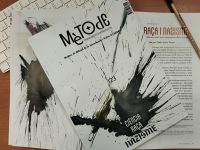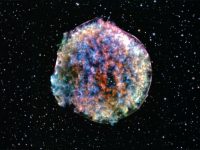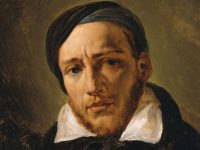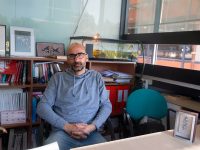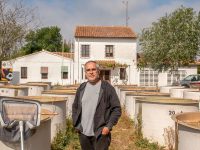 Photo: M. Vila (provided by the journal Escola Catalana) I would say that one of the bad habits we have at home is that we do not appreciate enough what we have… and this was the case with Dr. Margalef. His name has been referenced in thousands of books and articles from around the world and he has acquired an unusual international reputation, as he has long been the most cited not only biologist, but also scientist in our country. If he has reached this status being Catalan, can you imagine for a moment the impact he would have achieved had he been born in Boston or Cambridge, instead of in Barcelona? His work has been recognised with many awards, starting, of course, with foreign ones: Prince Albert medal of the Oceanographic Institute of Paris (1972), the prestigious Huntsman Award for Excellence in Marine Science (Canada, 1980), Foreign Member of the National Academy of Science in the United States (1984). They were followed by the Ramón y Cajal Award (1984)… and we could go on and on. Until the lastest one: the gold medal of the Government of Catalonia, less than a year ago. But this is not what matters most, nor is it what he valued most. He is most prominent for his contributions to oceanography, limnology and ecological theory, with approaches that were not only great (formulations of mathematical models), but quite revolutionary, such as the link with information theory. He was helped by the incredible flood of knowledge he absorbed and that provided him with this overview, so necessary for a thorough ecologist. My friend Javier Romero, good disciple of his, told me that what surprised him the most was the vast range of knowledge of biology he had acquired and which had turned him into a real naturalist. Everyone recognises his strict ethics and quality as a researcher, as well as the independence in his opinions: he always spoke his mind, even when his views were «politically incorrect», as in the case of nuclear energy, certain protectionist approaches, climate change… All this is indisputable, but those who were lucky enough to know him, besides these aspects, also enjoyed his qualities as a person. And that was decisive in our lives to guide us through the ever slippery world of science. I remember that he introduced me to the study of insects in the old Department of Ecology at the University square. Asked if he had a spot for a group of people that wanted to study plants and butterflies from a meadow in Aiguafreda, he replied, there’s no space, but we’ll come up with something. At first we did not understand his answer – it left us perplexed, as he often did – but he finally gave us the loft, nothing small, indeed. After some cleaning, we were able to work perfectly for years. This relationship never came to a halt, it continued with the supervision of my doctoral thesis and has lasted until now. Needless to say, without his ideas – that continually inspired and revitalised it – my thesis on evolutionary ecology would have no significance. I never saw him refuse to help anyone: you could feel he was glad to see you, and he invited you in, gesturing towards that director’s chair. When you looked worried or confused, he knew the right words… and always with those blue eyes and that smile, sometimes knowing, sometimes ironic. Even in the professional side I have to thank him for his help, because the pictures he had me take for counting scales encouraged me to submit my first macro pictures to Història Natural dels Països Catalans (Natural History of Catalan Countries). He insisted that I hang some of my pictures in his office at the Faculty. At the end I dared not ask him anything, because he never gave «no» for an answer, such as the brilliant speech he delivered in Altair bookstore – along with Ramon Folch – on the occasion of the launching of my book, «Kalahari. El desert vermell». He retained to the last moment that enthusiasm for nature and life that emanated from his whole self. The last time I saw him (last April), he told me – I’d like to think that as a parting gift – one of the most beautiful sentences I’ve ever been told: I want you to explore nature [pause] and to immortalise it in pictures. I cannot help feeling moved… I will hold his memory dear and I will try to imitate him in every way I can. It is unfeasible to encapsulate in these lines everything that Dr. Margalef represented for so many people, but it is possible to emphasise the importance of the «school» he created: many of us have to thank him for welcoming us so warmly to the department. He instilled into us, besides scientific rigour, his professional and personal ethics. Let us conclude by saying that there are currently good specialists in various branches of ecology, but not many thorough ecologists, in the style of Odum or Hutchinson. And even less naturalists in the old Greek sense. Perhaps our dear Ramon Margalef has been – and will always be in our memories – not only a universal ecologist, but the last great naturalist. |
«Perhaps our dear Ramon Margalef has been – and will always be in our memories – not only a universal ecologist, but the last great naturalist» Photos: L. Monje (Office of Scientific Photography, University of Alcalá de Henares) «He retained to the last moment that enthusiasm for nature and life that emanated from his whole self» Photos: L. Monje (Office of Scientific Photography, University of Alcalá de Henares) |
Search
© Mètode 2013 - 42. News from other Times - Issue 42. Summer 2004
Albert Masó
PhD in Ecology and Evolution, writer, teacher, and nature photographer (Barcelona, Spain).






